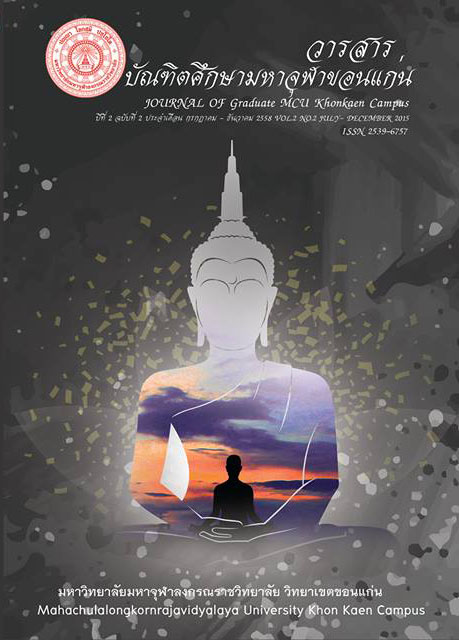An Application of Buddhist Ethical In Married Life of Thai Buddhist Women Being Married to The Non-Thai in Thunkhaoluang Districk, Roi-Et Province
Main Article Content
Abstract
The objectives of this thesis were: 1) to study the principles of the Buddhist ethics regarding earning living of Thai women who had married with the foreigners in Thungkhoaluang District, Roi-et Province, 2) to study general status of being married of Thai women who had married with the foreigners in Thungkhoaluang District, Roi-et Province, and 3) to study the implement of the Buddhist principles in leading lives of 15 Thai women who had married with the foreigners in Thungkhoaluang District, Roi-et Province. The research instruments applied in this study were: questionnaire concerning about the Buddhist principles in leading lives of Thai women who had married with the foreigners, and in-depth interview of 15 Thai women who had married with the foreigners. However, this thesis was conducted based on qualitative research methodology, collecting the data from analysis. Thai women who had married with the foreigners in the social science called as “Across Tradition”.
The result of the study found that 15 Thai women who had married with the foreigners in Thungkhoaluang District, Roi-et Province hold the following Buddhist principles as their major practice in leading lives, those were: five precepts (Pancasila) and the four virtues for social sodality (Sangahavatthu). Most of them had been married with Thai men before, when they were young, and they hardly ever knew anything about Buddhist principles. On the other hand, in this case, their Thai husband likely to engaged with causes of ruin such as addition to intoxicants and drug, no responsibility, and playful with gambling in which eventually brought family problems and that of ruins.
Impressively, when they got to know the foreigners and had married, they lives progressively change with the bitter living. The reasons might be the traditional background of the foreigners, unlike Thai men, that focus on responsibility, mutual respect, being content, and being honest – all these were what the Buddhist principles considered as the four virtues for social sodality or Sangahavatthu.
Article Details
References
มหาวิทยาลัยเกษตรศาสตร์.
มหาวิทยาลัยมหาจุฬาลงกรณราชวิทยาลัย.(2539).พระไตรปิฎกฉบับภาษาไทย.
กรุงเทพมหานคร : โรงพิมพ์มหาจุฬาลงกรณราชวิทยาลัย.
ยศ สันตสมบัติ. (2548). มนุษย์กับวัฒนธรรม. กรุงเทพมหานคร : สํานักพิมพ์ดี.
สํานักงานคณะกรรมการเศรษฐกิจและสังคม. (2547). เอกสารการวิจัย พ.ศ.2546-
2547. กรุงเทพมหานคร : ศรีพิชัย

